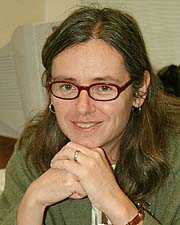|


 

|
August 9, 2004
Air pollution reveals privilege, politics, and
priorities, says author
By Jennifer McNulty
It’s been more than a century since women donned dark dresses
to hide the black soot of coal fires and architects streamlined building
designs because corrosive air pollution was eating away at ornately
carved stone details.
|

Sociologist Melanie DuPuis says air pollution "is like a
mirror of society."
Photo by Jennifer McNulty
|
But those examples from Manchester, England, illustrate how people
since the dawning of the industrial era have coped with the environmental
consequences of economic progress, said sociologist E. Melanie DuPuis,
an associate professor of sociology at the University of California,
Santa Cruz, and editor of the new book Smoke and Mirrors: The Politics
and Culture of Air Pollution (New York: New York University Press,
2004).
“Today we have smog alerts when the public is advised to stay
indoors, and incidents of pesticide drift when residents are evacuated
from their neighborhoods,” said DuPuis. “Like the residents
of early industrial cities, we deal with air-quality problems as part
of our everyday lives.”
A collection of essays by leading environmental scientists, historians,
and social scientists, Smoke and Mirrors tells the story of air
pollution from 19th-century Manchester to Los Angeles and Mexico City
today. The historical chapters foreshadow today’s cross-national
debates about acid rain, global warming, and ozone depletion, said DuPuis.
As a term, “air pollution” has defied simple characterizations:
Is it accidental or everyday, normal or abnormal, a sign of social progress
or urban decay, inevitable or controllable? These unresolved questions
signal that air quality demands an approach that goes beyond scientific
and economic measurement, incorporating history, sociology, and political
science, with a strong focus on issues of social justice.
“Air pollution is like a mirror of society--it reflects our culture,
our politics, our priorities,” said DuPuis. “A clean environment,
whether you’re dealing with air, water, or other resources, is
always the product of political compromise.”
Looking at air pollution historically, readers see who won, who lost,
and what has worked, said DuPuis, citing the early “win-win”
solution when industrialists decided to introduce more efficient coal-fired
boilers into their factories. The results--less pollution and lower
operating costs--were good for business and the environment.
Today, the trade-offs tend to be more difficult, as the chapter on coal-burning
family cookstoves in China by United Nations staff member Roger Rauffer
illustrates. These cookstoves are a major source of air pollution in
that country, according to Rauffer. “Most families burn the dirtiest
high-sulphur coal because it’s the cheapest. They have no alternative,”
explained DuPuis. “If we superimpose the U.S. model of air pollution
on China and ban cookstoves, we would cause substantial hardship.”
In their pursuit of cleaner air, the Chinese need to forge compromises
that take into account the needs of their own people, she said.
A chapter by Jill Harrison, a doctoral candidate in environmental studies
at UCSC, explores issues of social justice that have arisen between
farmers who see pesticide drift as the occasional accident and farmworkers
and residents who see themselves as regularly exposed to these hazards
on the job and in their neighborhoods.
In her own chapter, DuPuis discusses the politics of market-based incentives
to reduce air pollution. “Market-based solutions aren’t apolitical.
Like all environmental policies, they require that decisions be made,
and they should be made democratically, whether on the local level or
on the scale of the Kyoto protocol,” said DuPuis. “That certainly
isn’t how they’re being handled now, with the United States
and private business dominating environmental decision making.”
One of the biggest obstacles to progress is our collective dependence
on the automobile, said DuPuis. Automobiles, along with industry and
agriculture, are among the leading causes of air pollution. Although
motorists as a group are quick to call for strict regulation of industry,
they refuse to curb their own driving to reduce emissions.
“Programs that would require drivers to change their behavior
have so far been politically untenable,” said DuPuis. “That’s
why I’m such a big fan of the hybrid car. When I carpool my daughter
to Sunday school across town, I’m emitting less than half the emissions
of a regular car.” Carpooling amplifies the environmental benefits
but isn’t always practical, noted DuPuis. “The way we consume
resources has to change, but as the stories in this book tell us, technologies
that are easier for people tend to come first,” she said.
Return to Front Page
|
|